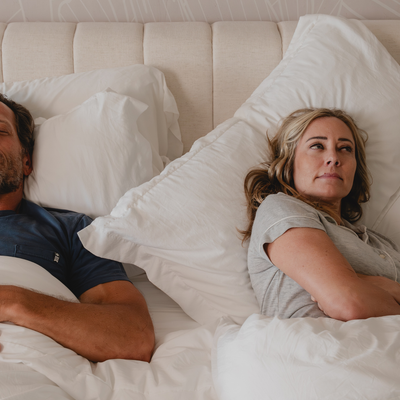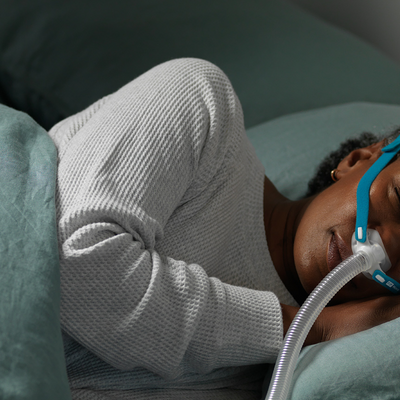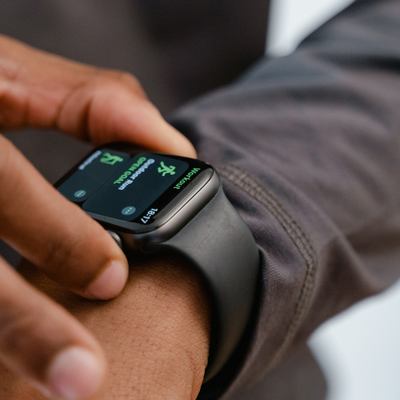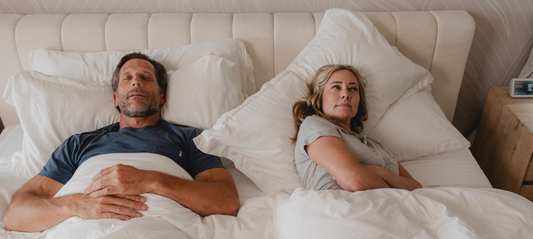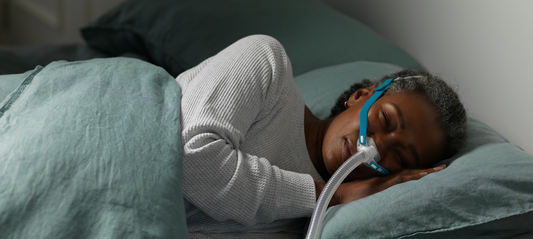Written by Nancy Kirk
May 16th, 2024
Mouth taping is a simple wellness trend that involves taping your mouth shut before bed. Proponents claim it encourages nasal breathing, which is associated with a host of benefits, including improved sleep quality and reduced snoring. However, these claims are anecdotal, and there isn’t a medical consensus on the effectiveness of mouth tape.
If you have a sleep disorder like insomnia or sleep apnea, you may be wondering if mouth tape can offer any benefits. Can something as simple as mouth tape really help your condition? Let’s discuss whether mouth taping is a technique to consider trying.
How Does Mouth Taping Work?
The rationale behind mouth taping is straightforward: it forces those who wear it to breathe through their nose, promoting better oxygen exchange and filtering out airborne particles. Nasal breathing is also said to help regulate blood flow and brain function, potentially increasing sleep quality.
Despite these benefits, scientific research on mouth taping is sparse. Some studies suggest that nasal breathing improves sleep continuity and reduces snoring, which could indirectly benefit those with sleep disorders. However, direct research linking mouth taping to improved sleep in clinical settings is still needed.
Potential Benefits of Mouth Tape
Many people have reported positive reactions to mouth-taping. However, it’s important to note most evidence is anecdotal. There’s no medical consensus on whether mouth taping is beneficial, and some professionals have concerns about its safety, particularly for those with respiratory issues. With that said, here are the benefits according to some who practice this technique:
-
Increased Blood Flow: Nasal breathing produces a gas called nitric oxide, which is known to increase blood flow and lower blood pressure, while also improving brain function.
- Improved Sleep Quality: Nasal breathing helps maintain optimal oxygen and carbon dioxide balance in the blood, some people believe it can lead to deeper, more restful sleep and even longer-lasting energy.
- Reduced Snoring: Mouth tape can potentially reduce snoring by promoting breathing through the nose. This is beneficial not just for the snorer but for anyone else sharing the room. Reducing snoring may also decrease the likelihood of sleep disturbances and improve overall sleep quality.
- Improved Oral Health: Sleeping with the mouth open can dry out the oral cavity, reducing saliva flow that helps protect teeth from decay and prevent infections. Taping the mouth shut helps keep it moist, preserving oral hygiene through the night.
- Support for CPAP Use: For those using CPAP machines for sleep apnea, mouth taping may be able to help prevent air from escaping through the mouth. This may also help patients from swallowing air during the night, which may be able to help prevent bloating.
While mouth taping shows promise in various aspects of health and wellness, it's important to approach this practice with caution and consult with a healthcare provider, especially for those with breathing difficulties, sleep apnea, or other health concerns.
Reviewing Studies on Mouth Tape
A few suggest that mouth taping can help reduce snoring and improve sleep quality for some individuals. For instance, a 2014 study found that participants who used mouth tape experienced a significant reduction in snoring frequency and intensity. However, this study had a small sample size and lacked long-term follow-up, making it difficult to draw broad conclusions.1
Other studies have had inconclusive results, and highlight potential drawbacks and the overall effectiveness of mouth tape. A 2022 study involving patients with obstructive sleep apnea (OSA) showed that participants still breathed through their mouths even with the mouth tape and had no positive effect. Some participants have also reported discomfort and difficulty tolerating the tape throughout the night.2
Can Mouth Taping Help Treat Sleep Disorders?
If you have a sleep disorder like sleep apnea or insomnia, you may be wondering if mouth taping can relieve your symptoms. Since some people claim it can improve sleep, you may consider using it in addition to your current health routine. However, there is little to no evidence that mouth taping can effectively treat sleep disorders.
Mouth Taping for Sleep Apnea
Sleep apnea, characterized by repeated breathing interruptions during sleep, is a serious disorder that affects millions globally. It presents itself differently for different people, so here are 5 signs you may have sleep apnea. Mouth taping might seem like a plausible aid for sleep apnea since it could help maintain an open airway by promoting nasal breathing.
However, this should only be used supplementally if you already have sleep apnea. Experts caution that mouth taping is not a recognized treatment for sleep apnea and should not replace your current CPAP therapy. Anecdotal evidence shows mixed results, so we recommend consulting with a medical professional to see if this could be right for you.
Mouth Taping for Insomnia
Insomnia involves difficulty falling or staying asleep, regardless of how tired someone may be. Supporters of mouth taping claim that by improving the quality of nasal breathing, it may help relieve insomnia symptoms.
However, insomnia often stems from psychological or environmental factors that mouth-taping might not address. While some individuals see improvements in sleep quality, these claims are not backed by scientific evidence.
Mouth Taping and Other Sleep Disorders
The impact of mouth taping on other disorders like narcolepsy and restless leg syndrome is even less clear than that on sleep apnea or insomnia. There are no direct studies investigating its effects, and any potential benefits are currently theoretical. For example, enhanced nasal breathing might improve oxygen saturation and sleep quality, potentially aiding those with narcolepsy, but this is speculative without clinical trials.
The Risks of Mouth Tape
While many wellness enthusiasts claim mouth taping has potential benefits, it's important to note the lack of scientific evidence supporting its effectiveness for sleep disorders. If not applied correctly, this practice can cause discomfort, skin irritation, or even feelings of claustrophobia.
Conditions such as a deviated septum, allergies, TMJ, or congestion can make nasal breathing difficult, especially if wearing mouth tape. Before trying mouth taping, consult with your healthcare provider to assess its safety regarding your individual health status.
Practice Healthy Sleep Hygiene
For those interested in better sleep, there are many proven techniques that can be used as alternatives to mouth taping. An effective bedtime routine can have an incredibly powerful effect on your overall health. These non-invasive methods can help you improve your sleep naturally:
- Consistent bedtime routine: Practice regular sleep schedules, a dark and quiet bedroom environment, and avoid stimulants before bedtime.
-
Behavioral therapies: Cognitive-behavioral therapy for insomnia (CBT-I) is particularly effective for managing insomnia.
-
Breathing exercises: Techniques such as diaphragmatic breathing can also promote calm moods and better sleep.
- Physical activity: Regular exercise, especially aerobic activity, can help improve sleep quality and reduce insomnia. Aim for at least 30 minutes of moderate exercise most days of the week, but avoid vigorous exercise close to bedtime.
Prioritize Your Sleep Health with Lofta
While mouth taping may offer some benefits to nasal breathers and reduce snoring, its effectiveness and safety for treating sleep disorders like insomnia or sleep apnea remain under-researched. Consult with your healthcare provider to ensure mouth tape is safe for you.
If you suspect you may have sleep apnea, click here to order an at-home sleep apnea study. If you need guidance on your sleep apnea journey, our team is here to answer any questions you may have! For more health tips and updates, follow our blog and stay tuned for more insights into simple interventions that might improve your health and well-being.



